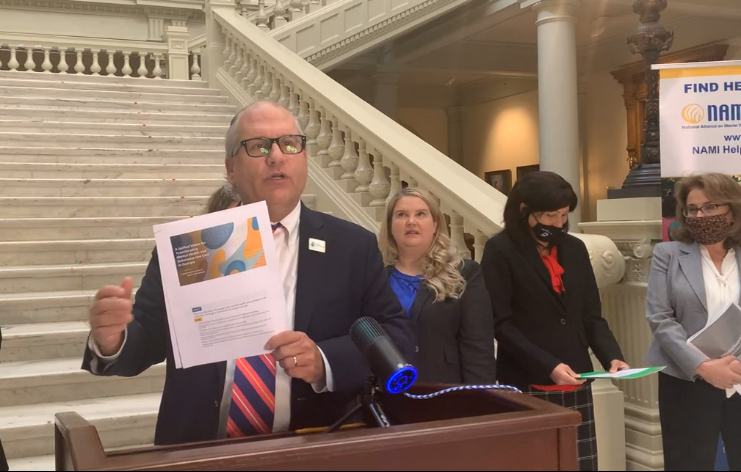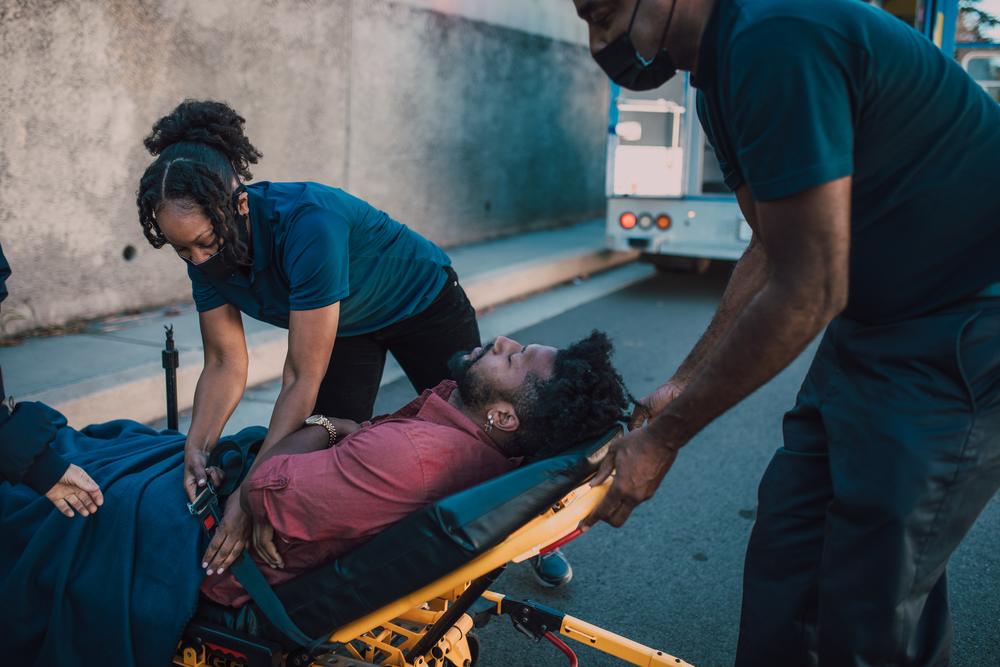
Caption
Jeff Breedlove holds a printed copy of the Georgia Mental Health Policy Partnership's Unified Vision for Transforming Mental Health and Substance Use Care in Georgia Nov. 10, 2021.
Credit: Ellen Eldridge / GPB News
|Updated: November 15, 2021 9:31 AM
Mental health and addiction recovery advocates say 2022 is the year to start focusing on mental health and substance use disorders. They traveled to the state Capitol on Nov. 10, 2021, to present their vision to lawmakers. GPB’s Ellen Eldridge reports.

Jeff Breedlove holds a printed copy of the Georgia Mental Health Policy Partnership's Unified Vision for Transforming Mental Health and Substance Use Care in Georgia Nov. 10, 2021.
When Kim Jones got involved with the National Alliance for Mental Illness, it was personal.
After giving birth to her son prematurely at 27 weeks, the Jones family found no problems receiving the best care from the best doctors in a Neonatal Intensive Care Unit.
However, things changed when her son started having behavioral health issues.
Suddenly, Jones said her son’s pediatrician would not listen to her concerns.
“I am the proud mother of a child with a mental health condition who was cutting himself and having suicidal ideation,” Jones said. “And it took me two and-a-half months to find care, somebody to see my son.”
The only reason she got her 9-year-old evaluated was by chance.
A cardiologist with whom Jones had a strong relationship just happened to know of ongoing research at Emory Rollins School of Public Health and Emory School of Medicine on the connection between heart defects and mental health.
The recently published results suggest that mental stress contributes substantially to the outcome of patients with heart disease, said Dr. Viola Vaccarino, who was lead author on the study published in JAMA.
“Data highlight the importance of emotional factors on the morbidity and mortality of patients with heart disease and have substantial implications for our understanding of the link between psychological stress and coronary heart disease," Vaccarino said in a press release.

Substance misuse treatment should get the same priority of care by insurance companies as heart defects do, according to a federal parity law passed in 2008, but there is no mechanism to ensure parity is enforced in Georgia.
The situation in health care is known as parity, meaning heart defects should be treated the same way by insurance companies as treatment for substance use disorder. A federal parity law passed in 2008, but there is no mechanism to ensure parity is enforced in Georgia.
Now, Jones is the executive director of the Georgia chapter of NAMI, which is one of more than 14 advocate groups in the Georgia Mental Health Policy Partnership.
Several members of the group met Nov. 10 at the state Capitol to present their unified vision to transform the way mental health and substance use disorders are addressed in Georgia.
“Parity improves health outcomes,” said Helen Robinson, associate director of public policy in the Carter Center’s Mental Health Program. “It helps prevent crisis and it can alleviate provider shortages, for example, in rural areas by ensuring that our providers are able be adequately reimbursed.”
Robinson said that, without parity, Georgia families must seek treatment out of network, pay more out of pocket, are limited to fewer visits for care or are denied coverage for needed behavioral health care because they are arbitrarily deemed to be not medically necessary without being provided an explanation.
RELATED:
Jones said the lack of access to care affects families across the state.
“There are children who are turned over to DFCS (the Division of Family & Children Services) by parents because they don't have the skills and the education to work with their child,” she said. “And that just doesn't need to happen.”
Georgia ranks 48th among the states in access to health care. During the General Assembly's special session, and the 2022 Georgia Legislative Session, the Georgia Mental Health Policy Partnership is dedicated to working to reform policies impacting the Georgia Mental Health Policy Partnership and Substance Use Disorder Community.
Representatives from the coalition are asking lawmakers for at least $150,000 to hire a parity coordinator who can track data and develop a method to regulate parity across the state.
“We are doing that through a special request of an appropriation, and we have the approval of the Office of Insurance Commissioner to request that,” Jones said.
Rep. Erick Allen, who was the co-founder of the General Assembly's working group on addiction and recovery, said parity is not a new issue in Georgia, but COVID-19 has shone a new light on the state’s challenges with delivering services.
He said getting the legislative work done in the upcoming session is paramount.
“There is not a more profound time,” Allen said. “We know that mental illness is real. We know that substance use disorders are real. But we also know that recovery is real.”
Gov. Brian Kemp and state House Speaker David Ralston each appointed members to the Behavioral Health Reform and Innovation Commission, which was created during the 2019 legislative session and extends through June 30, 2023.
The commission will propose major mental health reform bills for the next several years, Jones said.